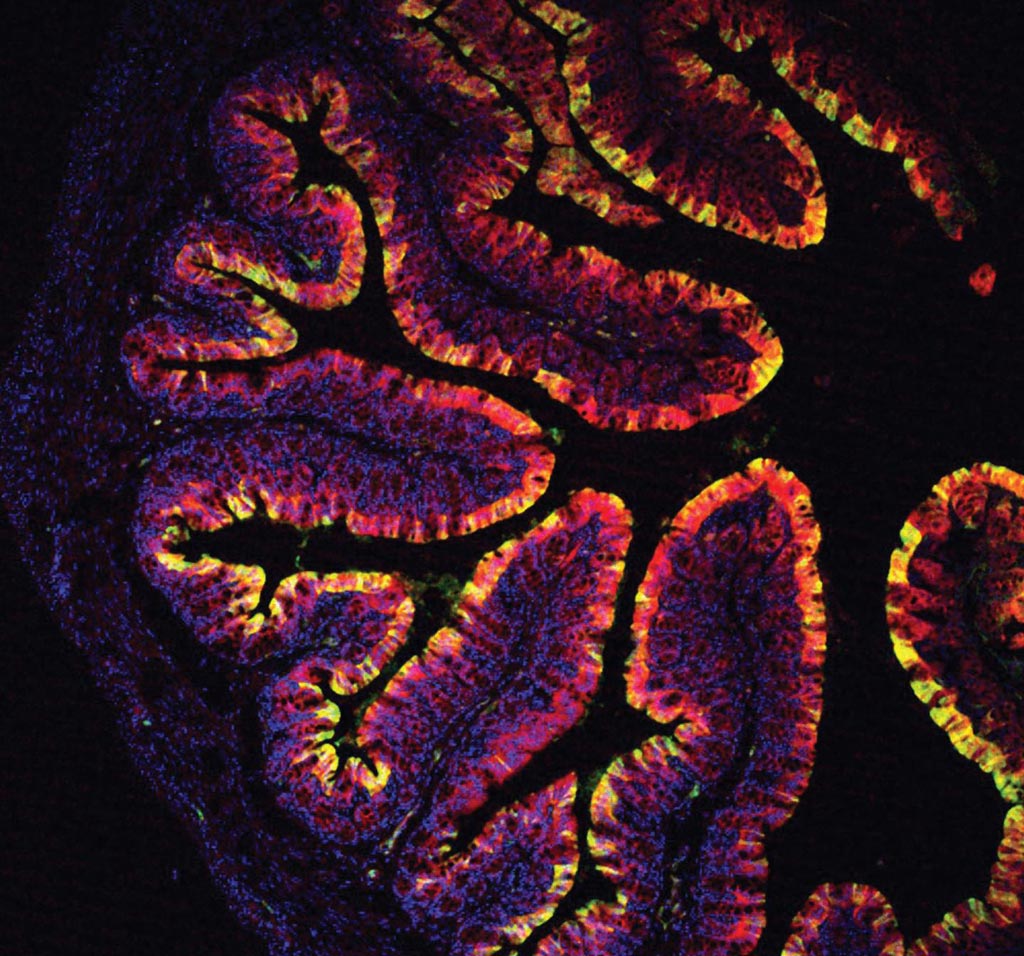Dietary Factors Limit Inflammation and Prevent Colon Cancer
By LabMedica International staff writers
Posted on 28 Aug 2018
A team of cancer researchers working with a mouse model has found that a chemical generated during digestion of vegetables such kale, cabbage, and broccoli activates a protein that helps maintain the integrity of the cells lining the gut – preventing chronic inflammation that has been implicated in the development of colon cancer.Posted on 28 Aug 2018
The epithelium and immune compartment in the intestine are constantly exposed to a fluctuating external environment. Defective communication between these compartments at this barrier surface underlies susceptibility to infections and chronic inflammation.

Image: A photomicrograph of a mouse colon from Cyp1a reporter mice after feeding on a diet supplemented with indole-3-carbinol (I3C) (Photo courtesy of Chris Schiering, Francis Crick Institute).
In this regard, investigators at the Francis Crick Institute (London, United Kingdom) found that generation of intestinal epithelial cells upon injury through infection or chemical insults was profoundly influenced by the environmental sensor aryl hydrocarbon receptor (AHR). This protein is a member of the family of basic helix-loop-helix transcription factors. AHR binds several exogenous ligands such as natural plant flavonoids, polyphenolics, and indoles, as well as synthetic polycyclic aromatic hydrocarbons and dioxin-like compounds.
The investigators reported in the August 14, 2018, online edition of the journal Immunity that mice receiving a diet rich in indole-3-carbinol (I3C), which is produced during digestion of vegetables of the genus Brassica, were protected from gut inflammation and colon cancer. Specific deletion of Ahr from intestinal epithelial cells resulted in failure to control Citrobacter rodentium infection due to unrestricted intestinal stem cell (ISC) proliferation and impaired differentiation, culminating in transformation into cancer cells. AHR activation by dietary ligands, such as I3C, restored barrier homeostasis, protected the stem cell niche, and prevented tumor formation.
"Seeing the profound effect of diet on gut inflammation and colon cancer was very striking," said senior author Dr. Gitta Stockinger, group leader at the Francis Crick Institute. "We often think of colon cancer as a disease promoted by a Western diet rich in fat and poor in vegetable content, and our results suggest a mechanism behind this observation. Many vegetables produce chemicals that keep AhR stimulated in the gut. We found that AhR-promoting chemicals in the diet can correct defects caused by insufficient AhR stimulation. This can restore epithelial cell differentiation, offering resistance to intestinal infections and preventing colon cancer. These findings are a cause for optimism; while we cannot change the genetic factors that increase our risk of cancer, we can probably mitigate these risks by adopting an appropriate diet with plenty of vegetables."
"A number of epidemiological studies suggested that vegetables may be protective against cancer," said Dr. Stockinger. "However, there is very little literature on which vegetables are the most beneficial or why. Now that we have demonstrated the mechanistic basis for this in mice, we are going to investigate these effects in human cells and people. In the meantime, there is certainly no harm in eating more vegetables!"
Related Links:
Francis Crick Institute













